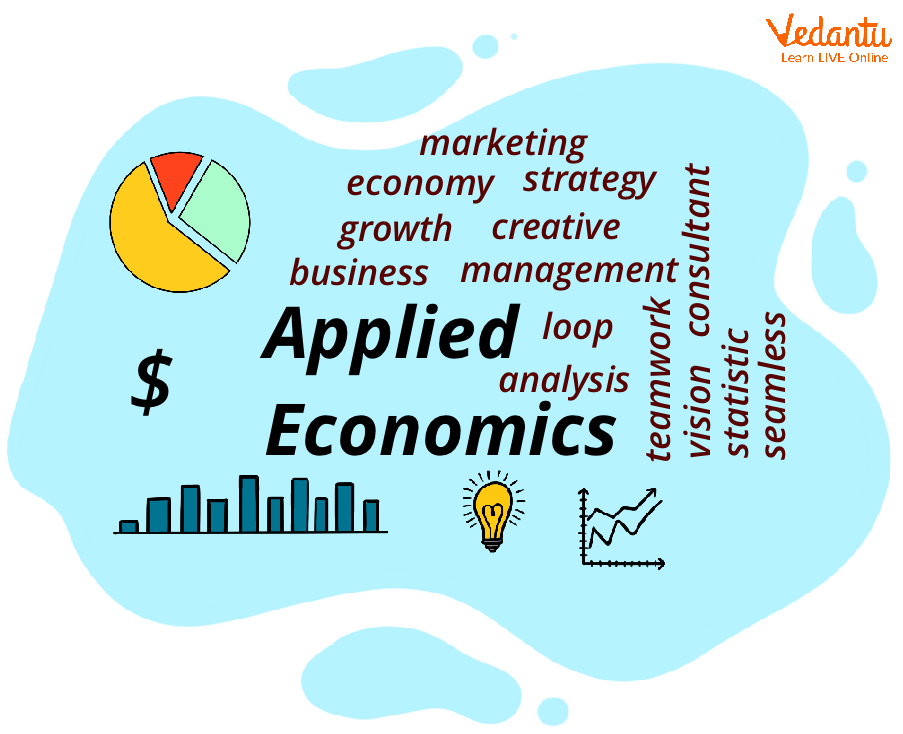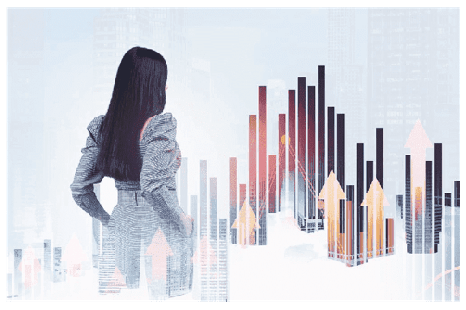




Applied Economics: An Overview
As the name implies, applied economics focuses on the practical application of theoretical concepts in the field. This field of study is not based solely on a single economic principle. Instead, it takes into account all of the subject's guiding concepts. It applies them in the relevant sectors to understand the impact of selected alternatives on an individual, policy-maker, and commercial decision-making.
A few concepts and principles that contribute to the effectiveness of applied economics are econometrics, the marginal principle, opportunity cost, the principle of voluntary returns, the rule of declining marginal utility, and the real/nominal principle.

Applied Economics
Application of economics
Applied economics is the application of economic theory to forecast the likely outcomes of various real-world actionable options. We can help people make better decisions by helping them understand the potential consequences of their decisions, whether they are made by individuals, businesses, or policymakers. If applied economics is a tool for determining the best methods to achieve those goals, then applied economics is the science that studies how people use the various, limited means at their disposal to achieve specific goals. As a result, applying economics can produce "to-do" lists for actions that can be taken to increase the likelihood of successful outcomes in actual events.

Application of Applied Economics
When employing applied economics, it may be necessary to first consider economic theories in order to formulate questions about a scenario or circumstance before utilising data sources and other frames of reference to arrive at a workable response. The concept is to establish a hypothetical result based on the specific current circumstances and using known ramifications of basic economic rules and models.
Importance of studying economics
Some points that states the importance of studying economics are given below:
Better Understanding of Surroundings: People who study economics have a better understanding of their surroundings. It allows people to understand other people, organisations, markets, and governments, allowing them to respond better to the challenges and opportunities that arise when circumstances change.
Wide Range of Careers: Economics majors are well-suited for a wide range of careers, including law, risk management, actuarial work, finance, foreign policy, public administration, politics, policy analysis, health administration, entrepreneurship, market research, journalism, undiscovered fields of the future.
Foundation for Analysing Public Policy: Economics provides the primary foundation for analysing public policy. Majors are better equipped to understand the underlying political concerns that influence economic and social outcomes.
Understanding related issues: An economist understands both the broad issues of generational consequences, welfare implications, and inequality, as well as the specific issues of tradeoffs, benefits versus costs, market failure, and public finance.
Participation in Public Policy Discussion: Students who major in economics have the knowledge and skills to participate in public policy discussions and take action to promote economic and social growth.
Uses of economics
Economics teaches you to think strategically and make decisions that maximise the outcome. People with economic and finance backgrounds are in high demand because they are well-qualified for positions in the banking and financial industries, such as accounting firms.
Because of the well-developed methodology used in the field, economics has grown to include instruments for many other disciplines, including politics, law, health, education, and management. Some are concerned that by employing economic principles, the assumption is made that people behave logically. To combat this, economists are incorporating knowledge from behavioural science, psychology, and neuroscience.
Case Study
How applied economics works? Explain with examples.
Let's look at an example from applied economics to help you understand the concept:
Customers typically look forward to purchasing items at significant discounts or for free. As a result, marketers use this proclivity to exaggerate the cost of their items while indicating the true price.
For example, brand A charges 30 Dollar for a T-shirt with a market value of only 20 Dollar. On the other hand, during the holiday season, it announces a year-end sale and offers a $10 discount on the same T-shirt. As a result, even after offering discounts, the company sells the T-shirt at its original price, and customers are thrilled to get it at a significant discount.
The preceding example shows how to use a pricing strategy based on applied economics to determine market consumer behaviour.

Uses of Applied Economics
Conclusion
Whether a company decides to buy an asset or sets the price at which it will sell its goods and services to customers, applied economics can help. This field of study is critical for addressing problems that applied mathematics and accounting cannot.
However, in order for this topic to be applied, some assumptions must be made. Typically, economic analysis is performed for a large audience. As a result, such broad rules may not apply to specific situations, such as specific locations or markets.
FAQs on Applied Economics: Concepts and Applications
1. Applied economics is the application of economic theory to forecast the likely outcomes. Explain what is applied economics and management in detail.
Applied economics and management is concerned with the application of theoretical concepts to a specific problem, condition, or cause. It extends the application of economics from the text to the real world, using it as a tool rather than simply articulating the theory. The main goal is to ensure that people understand economics well enough to make sound decisions based on accurate assessment and analysis of various factors. Furthermore, it seeks to raise the standard of business conduct by implementing accepted ethical standards, improving daily life, developing policies that benefit the general public, and making pertinent decisions with these considerations in mind. It is critical to study the subject because it allows decision-makers, policymakers, and business leaders to understand how their actions affect the decisions they make.
2. Explain some examples of applied economics.
Let's look at some of the contemporary applications of applied economics.
Environmental Economics: How much more expensive are market-based environmental incentives versus command-and-control environmental regulation? How can carbon emissions be assessed? Should we? Applied economics is used to frame solutions to these problems.
How can economic principles and cognitive psychology be used to analyse and predict human behaviour in behavioural economics? In practice, economics explains how.
Law and economics are inextricably linked fields. The legislation codifies ethics, markets, and human behaviour. Applied economics predicts the best way to put those laws into action.
3. How does applied economics address economic issues?
In the social sciences, the term "applied economics" refers to the application of economics to various aspects of society. In contrast, core economics investigates economic theory but lacks practical applications. Applied economics assists in the resolution of economic issues by providing knowledge about how individuals, organisations, and governments behave. As a result, economic actors may be able to solve problems and make better decisions. Economists, for example, may explain how markets work by demonstrating behaviours that have costs and more, allowing businesses and individuals to avoid those costs and find solutions to their problems.























